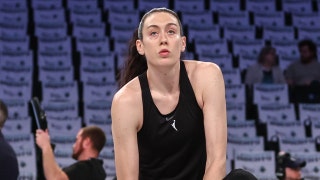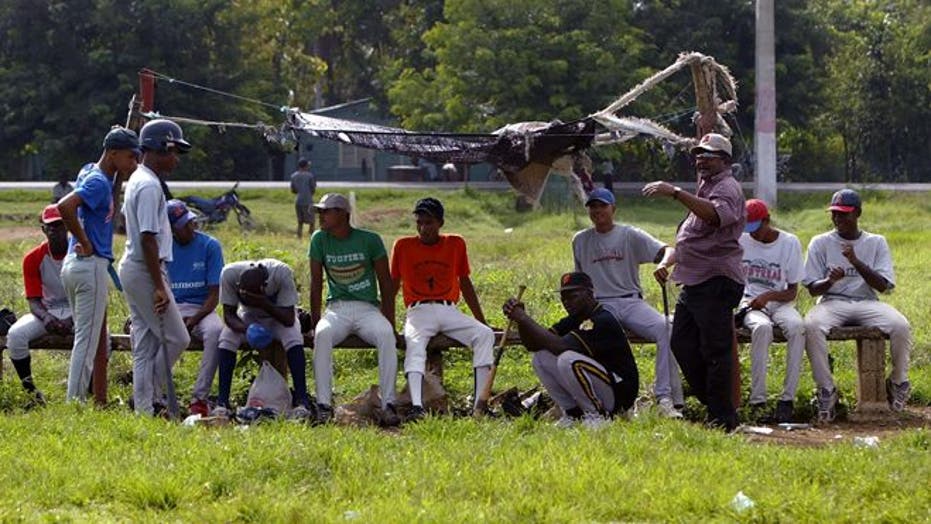For boys in the Dominican Republic, it’s about becoming a major league ballplayer – at all costs.
In a country where 40 percent of the nation lives at or below the poverty rate, Dominicans who are 12 to 14 years old regularly quit school to begin baseball training in private academies in the hopes of saving their families from a lifetime of poverty. For these boys, it’s baseball or failure.
For Major League Baseball, like in any business, it’s about the bottom line, mainly, how to find the next franchise player at the lowest cost possible.
But the combination of both priorities mix together like a toxic concoction, in the form of steroid-filled syringes, made easily available to thousands of teenage Dominicans dreaming of lifting their families out of poverty with a swing of the bat.
The recent suspension of 13 players, 9 of whom are Dominican, by Major League Baseball in the Biogenesis scandal highlights how the growing problem in the country has affected the sport – and many are questioning whether baseball is doing enough to fight the steroid culture in the Dominican Republic, a country the majors has grown more and more reliant on for top talent.
"If they see that baseball is not the only way out - you’ll see a dramatic drop in use of steroids because the win at all cost mentality will disappear."
As it has each year since MLB began releasing data in 1995, the D.R. led all foreign countries with the most players in the majors in 2013 with 89 players on opening day rosters (out of 856) – the fourth most the nation has ever produced. But, at the same time, the country has a disproportionate number of players who have violated the leagues performance-enhancing drug policy.
According to the MLB, thus far in 2013, 15 of the 44 players suspended for steroids in the minor leagues are Dominican and, in 2012, 31 minor league Dominicans were suspended out of 105 total suspensions.
The problem, say experts like David Fidler, co-author of “Stealing Lives: The Globalization of Baseball and the Tragic Story of Alexis Quiroz,” is Major League Baseball’s knack for being reactionary, suspending players, instead of proactive in choosing not to attack the root of the PED problem, like the drug dealers themselves.
The players implicated in the Biogenesis scandal, including Alex Rodriguez, Nelson Cruz, and Jhonny Peralta, were only caught because MLB cut deals with the drug dealers themselves, who in this case, exchanged valuable information on their customers for immunity.
In the Dominican Republic, many of these dealers, who Fidler calls part of the root of the problem, are referred to as buscones – individuals who train players and then get a cut of their signing bonus, reportedly 10 to 40 percent, when they sign on to an MLB team.
“We’ve been making these arguments for years – we need to go after this buscones system hard,” Fidler, a lawyer, told Fox News Latino. “We can’t regulate in the Dominican Republic. But Major League Baseball has the power to tell the teams what to do. They haven’t done it. They’ve dragged their feet.”
Now, he said, “there is a cancer growing in Major League Baseball.”
Fidler said the MLB has created a business model, primarily in the Dominican Republic, with built in economic incentives for all parties involved, with teenagers and children as the most valued commodity.
The buscones invest in young 13 to15 year old prospects before they reach age 16 and helps them become eligible for one of 30 official MLB academies where teams house young Dominican players in the hopes that a handful become major league players.
Buscones make money – and the MLB pumps millions into the local economy. In return, the MLB receives top free agent talent from a country that regularly produces some of world's best baseball players.
While experts say Major League Baseball could do more to cut down on the steroid problem in the Dominican Republic, the league claims it is trying.
MLB has increased the number of drug tests in the D.R. by 50 percent between 2004 and 2013. During that time, the positive test rate has decreased from 11 percent in 2004 to 1.4 percent in 2012. They have also implemented mandatory performance-enhancing drug programs educating players on MLB’s official drug policies and the negative, long-term health effects of steroid use.
The Alderson Report
But Fidler, and others, point out that MLB did not begin addressing the seriousness of the problem in the Dominican Republic until the issue was publicly exposed in 2009, in large part because of the release of the documentary “Ballplayer: Pelotero.” The documentary followed two young 16-year-old Dominican prospects and showed how MLB – and the buscones – operate there.
At that time, MLB Commissioner Bud Selig appointed a committee, headed by current New York Mets General Manager Sandy Alderson, "to examine Major League Baseball and Club operations in the Dominican Republic." The results of the committee were published in September 2009, in the "Alderson Report" – the first comprehensive investigation by MLB into the Dominican Republic’s baseball steroid use. The report acknowledged that MLB had serious and long-term problems in the D.R., and recommended actions for reform.
The report also acknowledged that teams were hesitant in acknowledging buscones out of concern that clubs would be denied access to top talent.
MLB created an international talent committee to better regulate issues in the Dominican Republic and talked about implementing an international draft, which would effectively end the wild west buscones culture in the country. But talks of an international draft have ended for now, and, according to Fidler, the MLB has been silent about what the committee has actually done.
"Root and branch reform in the Alderson Report gave a glimpse that they needed to fix the system," Fidler said. "We fear that’s gone and the talent committee isn’t serious about the rest of the issues."
Desperate Mentality In Pursuit Of Baseball Dreams
Erick Almonte, a Dominican ballplayer player who faced suspension after testing positive while he played for the Milwaukee Brewers's Triple-A affiliate, said steroid use in the Dominican Republic is a problem the MLB needs to properly address – and now.
"Everyone knows the problem that exists in the Dominican Republic,” said Almonte, who was eventually cleared after his samples underwent further testing. “It's not the same there as it is here. You can get these substances without a prescription.”
He said Dominican players get desperate trying to make it big – and it’s so easy in the country to cut corners.
In Dominican pharmacies, testosterone is legal and easily sold over the counter. Though other types of performance-enhancing drugs are illegal in the country, they are often readily available and sold in neighborhood pharmacies.
“I know there aren't that many opportunities in our country and although we know they're prohibited, we keep trying to cheat the system,” Almonte said. “I hope that our mentality changes, too."
Charles Farrell, co-founder of the Dominican Republic Sports and Education Academy in San Pedro de Marcoris, said he is trying to change this Dominican mentality of desperation. He has devoted his life to helping the 98 percent of Dominican ballplayers, mostly children, who sacrifice their education to try and make it to the major leagues – but don’t.
Farrell said many of those players consider themselves failures if they don’t become professional baseball players.
They think, “If I take steroids I win, and the team wins, what’s the harm if I cheat and everyone wins? They don’t realize they harm themselves,” he said.
Farrell said the recent suspensions of MLB All-Stars Rodriguez and Cruz could deter kids from taking steroids. Ultimately, though, he believes there needs to be a dramatic shift in the way Dominicans think of baseball, away from the only-way-out mentality.
But, Farrell said, that will only happen if there is a long-term solution that attacks the root of the problem. The solution, he said, is education.
"Even when I talk to kids – 98 percent will not make it to the majors – but it’s almost like every kid is sitting there saying, well ‘I’m part of the 2 percent,’" Farrell said. "If they see that baseball is not the only way out, you’ll see a dramatic drop in use of steroids because the win-at-all-cost mentality will disappear."
Freelancer Adry Torres contributed to this article.









































